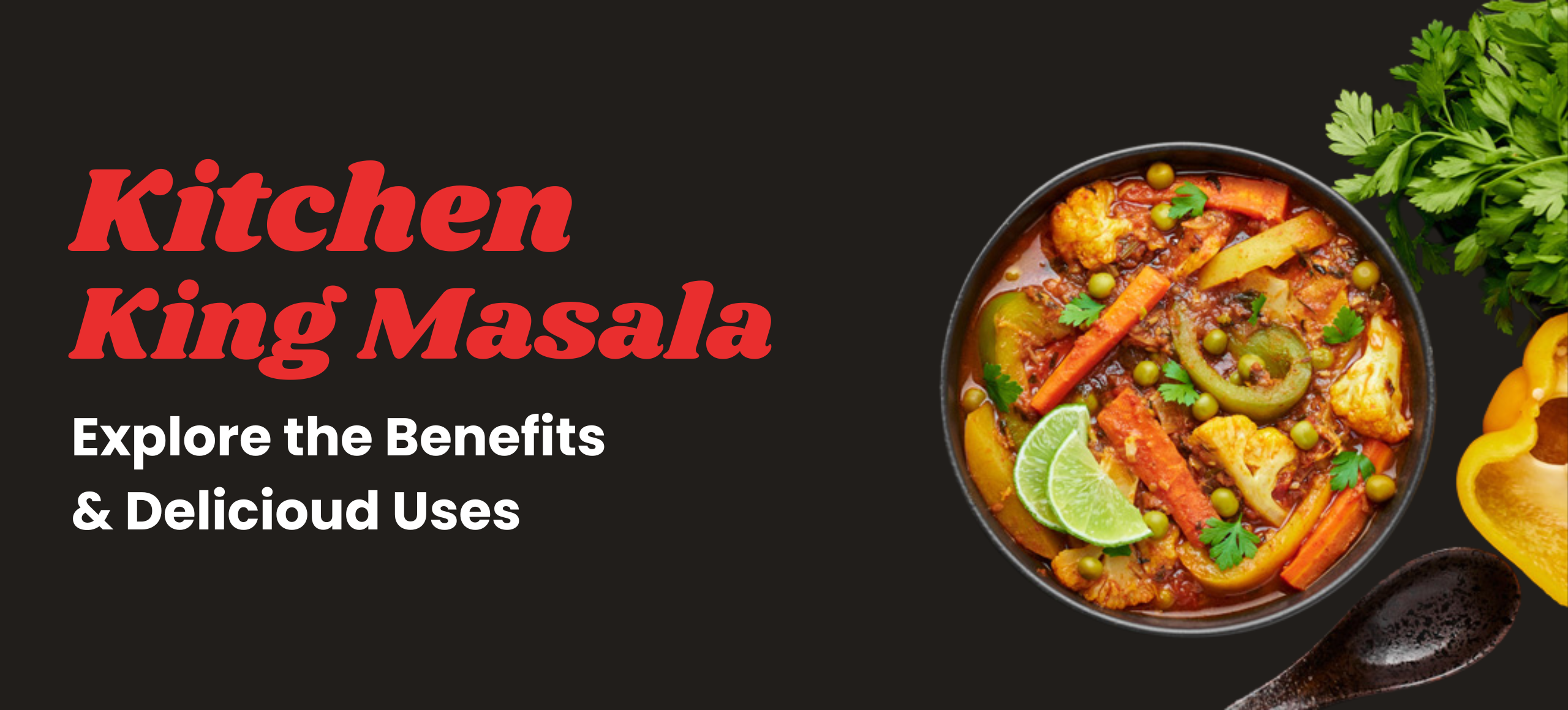Kitchen King Masala: Uses and Benefits
Acknowledge: The Secret to Indian Culinary Magic
Have you ever thought about what makes Indian dishes so flavorful and complex? A lot of that comes from using carefully made spice mixes, called masalas. One of the best is Kitchen King Masala, which is popular because it can be used in many dishes and makes them taste even better.
Promise: Transform Your Cooking with One Spice Blend
In this blog, we’ll look at how Kitchen King Masala can change the way you cook. We’ll talk about how it adds great flavor to traditional meals and how it can also be good for your health. You’ll see why this spice mix is important for every kitchen. We’ll also give you advice on how to make and store it so it stays fresh longer.
Preview: What to Expect
Here’s what you’ll take away:
- How Kitchen King Masala is different from other spice blends.
- Its use in North Indian cuisine and beyond.
- The health benefits are packed into every spoonful.
- How to make it at home and preserve it properly.
What is Kitchen King Masala?
Kitchen King Masala is a flexible spice mix commonly used in Indian cooking to improve the flavor and smell of meals. Its name shows its status as the “king” of spice blends, due to its special mix of tastes and its capability to work well with many different ingredients.
This masala typically includes:
- Cumin and Coriander: For earthy and citrusy notes.
- Turmeric: Adds color and anti-inflammatory properties.
- Cardamom and Cinnamon: Infuse warmth and sweetness.
- Cloves and Black Pepper: Provide a subtle kick.
These spices are first roasted to bring out their natural oils and then finely ground into powder. The final mix has a balanced taste, with both strong and delicate flavors, making it perfect for dishes like curries and soups.
Uses of Kitchen King Masala in Everyday Cooking
1. Enhancing Traditional Indian Dishes
Kitchen King Masala is frequently used in North Indian cooking, where its strong flavors improve both vegetarian and non-vegetarian dishes.
- Curries and Sabzis: Add a spoon to vegetable curry like aloo gobi or baingan bharta.
- Paneer Dishes: It comes as a good complement to lightly spiced, creamy paneer recipes like shahi paneer or paneer butter masala.
- Dal Fry: Add it to lentil dishes for the increased intensity of the broth with a presentation of flavors.
2. A Secret Ingredient in Rice Recipes
Kitchen King Masala can also work wonders in rice dishes like pulao and biryani. Just a small amount can add a rich, fragrant flavor, transforming a basic rice dish into a gourmet treat.
3. Beyond Indian Cuisine
Feel free to try different things! You can use this masala in:
- Vegetable Stir-Fries: Add a sprinkle of it for a touch of Indian flavor.
- Soups and Stews: Add complexity to broth-based dishes.
- Grilled Meats and Tofu: Rub it on as a seasoning before cooking.
Benefits of Kitchen King Masala in Indian Cuisine
Kitchen King Masala is essential not only for its taste but also for its health benefits.
1. Rich in Antioxidants
Ingredients such as turmeric, cinnamon, and cloves are full of antioxidants that help fight free radicals in the body, lowering the chance of long-term illnesses.
2. Aids Digestion
Spices like cumin and coriander improve digestion by encouraging the stomach to produce more enzymes. Fennel and asafoetida (in some versions) also help with bloating and indigestion.
3. Boosts Immunity
Turmeric, a main ingredient, has curcumin, which is known for its anti-inflammatory and immune-boosting effects. Kali mirch powder helps the body absorb curcumin better, making its benefits stronger.
4. Improves Metabolism
The warm spices in Kitchen King Masala can help speed up your metabolism, making it simpler for your body to burn calories.
5. Regulates Blood Sugar
Cinnamon and fenugreek seeds (optional) can help keep blood sugar levels healthy, making this masala a good option for people who have diabetes.
How to Make and Store Kitchen King
Homemade Kitchen King Masala Recipe
Creating your own Kitchen King Masala guarantees freshness and lets you customize the taste to your preference. Here’s a simple recipe:
Ingredients:
- 2 tbsp cumin seeds
- 2 tbsp coriander seeds
- 1 tbsp turmeric powder
- 1 tbsp fennel seeds
- 1 tsp cloves
- 1 tsp black peppercorns
- 2-3 cinnamon sticks
- 2 green cardamoms
- 1 black cardamom
- 2 dried red chilies
Steps:
- Roast the whole spices (except turmeric) on low heat until they smell good.
- Let them cool down, then grind them into a very fine powder.
- Add the turmeric powder and put everything in a tightly sealed container.
Storage Tips
- Room Temperature: Keep in a cool, dry spot for up to 3 months.
- Refrigeration: Extend freshness for up to 6 months.
- Freezing: For long-term storage (up to a year), freeze the masala in small amounts.
Proper storage preserves the masala’s aroma and potency, ensuring every dish tastes as it should.
Why Choose Kitchen King Masala Over Other Spice Blends?
Kitchen King Masala has a special mix of tastes that you won’t find in garam masala or curry powder. Here’s why it’s different:
- Flexibility: Works well in both Indian and mixed-style dishes.
- Gentle Spiciness: Its mild heat is perfect for families with different spice preferences.
- Rich Aroma: The use of spices like cardamom and cinnamon gives it a unique, full-bodied flavor.
Conclusion
Kitchen King Masala is more than just a spice mix; it’s a big help in making your food taste amazing. It not only makes your dishes more flavorful but also has health benefits, so it’s really important to have in your kitchen. Whether you’re making a rich curry, a tasty rice dish, or even a basic lentil soup, this masala makes sure your meals are special.
Try using it in your cooking today—you’ll soon understand why it’s called the “king” of masalas. Let us know in the comments what dish you’re most excited to try with it.
Frequently Asked Questions
Yes! It works wonderfully as a marinade for grilled vegetables, tofu, and meats.
Most versions are naturally gluten-free, but always check labels or ensure your homemade blend doesn’t include fillers.
While both are spice blends, Kitchen King is milder and better suited for dishes requiring a subtler spice profile.
Absolutely. A small pinch can elevate the flavor of vegetable or lentil-based soups.



